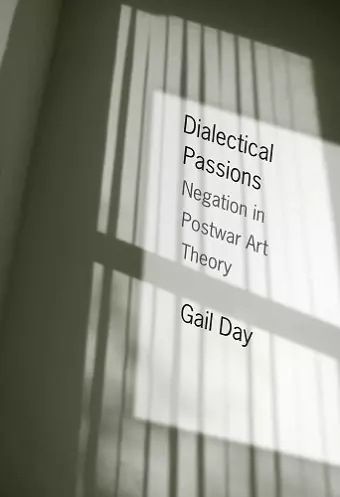Dialectical Passions
Negation in Postwar Art Theory
Format:Hardback
Publisher:Columbia University Press
Published:28th Jan '11
Currently unavailable, and unfortunately no date known when it will be back

Dialectical Passions is a significant contribution to art theory and cultural theory in the wake of the crisis of postmodernism and the current melancholic attachment to the 'lost object' of modernist art and its incipient nihilism. Day reinvigorates the debate on dialectics and negation to clarify how much of this theory relies on a misunderstanding of the commodity form of art under capitalism. -- John Roberts, University of Wolverhampton, and author of The Intangibilities of Form: Skill and Deskilling in Art After the Readymade Dialectical Passions is an exceptional attempt to discern, excavate, and elaborate a configuration of dialectical (visual) cultural criticism that has entered the mainstream over the past twenty or thirty years, but largely with the muting of its radical, political, and philosophical claims. Gail Day restores these claims, sounding out their sources and faults with a theoretical sophistication rare within the field of contemporary visual culture. -- Stewart Martin, Middlesex University At a moment when politics is once again at the forefront of artistic practice, and theory is rediscovering its critical vocation, Gail Day is an indispensable guide to the crucial place of negativity in thinking about art. Combining subtle scholarship and admirable intransigence, she explores the often subterranean fate of the dialectic in decisive debates over allegory, architecture, and capitalist abstraction. Dialectical Passions is a bracing and timely reminder that the negative lies at the heart of any renewal of radical energies in the arts and beyond. -- Alberto Toscano, Goldsmiths, University of London, and author of Fanaticism: On the Uses of an Idea
Representing a new generation of theorists reaffirming the radical dimensions of art, Gail Day launches a bold critique of late twentieth-century art theory and its often reductive analysis of cultural objects. Exploring core debates in discourses on art, from the New Left to theories of "critical postmodernism" and beyond, Day counters the belief that recent tendencies in art fail to be adequately critical. She also challenges the political inertia that results from these conclusions. Day organizes her defense around critics who have engaged substantively with emancipatory thought and social process: T. J. Clark, Manfredo Tafuri, Fredric Jameson, Benjamin H. D. Buchloh, and Hal Foster, among others. She maps the tension between radical dialectics and left nihilism and assesses the interpretation and internalization of negation in art theory. Chapters confront the claim that exchange and equivalence have subsumed the use value of cultural objects--and with it critical distance-- and interrogate the proposition of completed nihilism and the metropolis put forward in the politics of Italian operaismo. Day covers the debates on symbol and allegory waged within the context of 1980s art and their relation to the writings of Walter Benjamin and Paul de Man. She also examines common conceptions of mediation, totality, negation, and the politics of anticipation. A necessary unsettling of received wisdoms, Dialectical Passions recasts emancipatory reflection in aesthetics, art, and architecture.
Gail Day's Dialectical Passions is a uniquely important book. Day argues persuasively that the powerful negations that characterize the finest Marxist thinking about art architecture to come from the postwar New Left is characterized by real--and passionate--dialectical instability. It is largely this, in her view, that prevents it from being fully subsumed by the hegemonic forms of late capitalist culture. The negations practiced by these writers, most notably T. J. Clark and Manfredo Tafuri, have been uncompromisingly realistic and resolutely non-romantic. At the same time, she argues, they share with Marx a belief, however endangered it now is, in the necessity of a genuinely radical political alternative. Day's book makes evident the value of such thinking in resisting the fixed polarities and relentless pessimism of much present-day cultural theory and its increasingly empty critiques of capitalist commodification. -- Alexander Potts, Max Loehr Collegiate Professor, Department of History of Art, University of Michigan A wonderfully enjoyable examination of some of the key figures, debates, and points of intrigue in art theory influenced by the New Left. -- Matthew Flisfeder PUBLIC
- Winner of Deutscher Memorial Prize 2011
ISBN: 9780231149389
Dimensions: unknown
Weight: unknown
320 pages